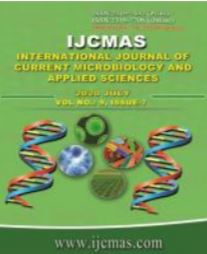


 National Academy of Agricultural Sciences (NAAS)
National Academy of Agricultural Sciences (NAAS)

|
PRINT ISSN : 2319-7692
Online ISSN : 2319-7706 Issues : 12 per year Publisher : Excellent Publishers Email : editorijcmas@gmail.com / submit@ijcmas.com Editor-in-chief: Dr.M.Prakash Index Copernicus ICV 2018: 95.39 NAAS RATING 2020: 5.38 |
Abiotic stress includes extreme temperature, salinity, drought, waterlogging, etc. highly influenced the plant growth in affected area. Abiotic stress reduced the development of plant which ultimately results in reduction in yield. Agricultural crops are highly influenced by abiotic stress which is due to the continue change of climate and deterioration of environment caused by human activity. Plants activities such as photosynthesis, flowering, pollination, transpiration, etc. affected by different abiotic stress experienced by plants at these stages. High temperature results in increase in transpiration rate which cause water stress in plant cell. Similarly, high salt condition in the root zone affects the osmotic potential of plant root cell which results in exosmosises in plant root cell. Waterlogging condition decreases the respiration rate of roots and produces methane gas which is a major gas responsible for climate change. However, to overcome the effects of abiotic stress, plant has developed a number of physiological and cellular changes in their life mechanism. Also, efficient resource management helps in reducing the impact of these abiotic stresses on crop. However, these management practices being long drawn and cost effectives, there is a need to develop simple and low cost strategies for abiotic stress management.
 |
 |
 |
 |
 |